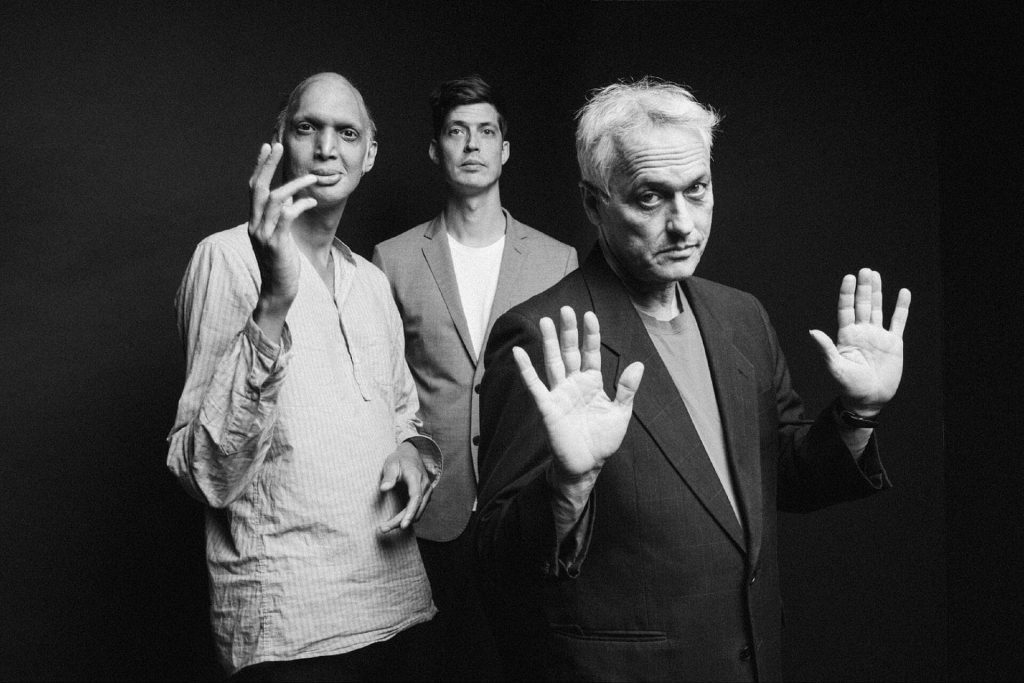
photo: Ebru Yildiz
***
“The significance of the title is that I couldn’t think of another,” Marc Ribot freely admits. He chuckles when he says it; although the guitarist, vocalist and composer, who is talking about Connection, the fifth full-length studio release from his trio Ceramic Dog, could have just made something up and no one would’ve been the wiser. He could, for example, have waxed eloquently about how the album’s 10 tunes blur the lines between genre, disposition, texture and purpose, yet share a palpable connection in their collective spirit. Or he could have noted that his own career has always been about drawing intersecting lines or connecting the dots between his prior work with everyone from Tom Waits to Elvis Costello, Marianne Faithfull, Medeski Martin & Wood, Diana Krall, John Zorn, Trey Anastasio, Richard Hell, Yoko Ono, and Robert Plant & Alison Krauss.
Instead, Ribot, 69, simply explains that the title Connection was inspired by a sculpture created by the 7-year-old daughter of the band’s bassist, Shahzad Ismaily, who has anchored Ceramic Dog along with drummer Ches Smith since its inception in the early 2000s. “What struck me was that it was this kind of shelter that was made by all these connections,” Ribot says, “but it was weirdly shaped and the connections were all very fragile. That feels like our moment.”
The artwork, depicted on the album’s cover, is an appropriate choice because the music on Connection also feels very much of the present: It draws from blistering rock, outré jazz, New Jersey native Ribot’s beloved vintage soul music, punk, funk and much more. There’s chaos and calmness, unchecked anger and implied salvation. There’s experimentation, but there’s also order. The title track—between the severity of the guitar work, the freewheeling, sparring rhythm section and Ribot’s free-associated lyrics—will shake you to the core.
“I’ve developed this wonderful ability to rant,” he says of the opening tune. “It’s automatic, like from a broken dispensing machine or something. But I have a methodology. I just write down what I rant, and then I look through it carefully to see if any of it makes sense. And, if any of it does, I remove it.”
“Soldiers in the Army of Love,” a couple of tracks later, has a backstory worth knowing. “We hold these truths to be self-evident,” Ribot practically barks. But, if you’re thinking that the rest of the Declaration of Independence is about to follow, well, not quite. However, the song’s lyrics still find root in the Civil Rights movement and other more recent battles against oppression.
“Everybody knows what protest is—resistance is not protest,” Ribot says, summarizing the gist of the song’s inspiration. “Protest appeals to an authority that you recognize. Resistance is when you no longer recognize the authority of the people you’re appealing to. You’re trying to get them out of the position of deciding anything. We are not going to re-argue our humanity. We are not going to re-argue our political equality. Those are things we hold self-evident.”
While Ribot’s lyrics are affecting and often border on alarming—another song, “Heart Attack,” extols the virtues of cursing—the trio truly excels on their instrumentals. And, throughout, the musical interplay between the three musicians varies from hyper[1]focused to willfully anarchic. It’s difficult to believe, given the looseness of their jams, that some of those tracks did not form out of improvisations but were composed. “They have chords that eventually go someplace,” Ribot says.
Ribot, Ismaily and Smith have developed a powerful connection of their own over their nearly two decades together, and on several of Connection’s tunes, the trio is augmented by guests who magnify the overall sonic depth—keyboardists Anthony Coleman and Greg Lewis, the remarkable saxophonist James Brandon Lewis, vocalist Syd Straw, clarinetist Oscar Noriega and cellist Peter Sachon. The songs were largely worked out in a Brooklyn, N.Y., studio, engineered by Vishal Nayak and mixed by Ben Greenberg. “I know this destroys a lot of people’s myths, but the best stuff starts out in the studio and grows into something,” Ribot says.
Of course, since he is known by most for his brilliant guitar playing, Ribot still makes sure to find room for some typically impressive axe work on the record. But this time, the concentration was spread out further than on previous Ceramic Dog releases. “There’s plenty of guitar,” he says, “but it’s less dependent on the guitar playing to make it work. It’s more about the composition, arrangements and sonic textures.”
There’s also much allowance for expansion tucked in. Once Ceramic Dog takes the material out on tour, which they just did this summer, something else happens. “We’re incapable of playing anything the same way twice,” Ribot says. “So we’re always looking for ways to open things up. I’m not interested in anything except everything.”
A good part of Ribot’s attitude toward openness in music—the album’s sole cover is the 1953 popular song “That’s Entertainment”— derives significantly from his history as an in-demand session player.
“It comes from literacy, not only in terms of listening to a lot of different music, but also reading and going to movies and checking out what visual artists are doing,” he says of his ability to adapt to different settings. “It’s about how to create something that doesn’t gross you out, that you don’t think is corny or wrong or bad. I just try to rock the house, which is basically all I ever cared about.”
